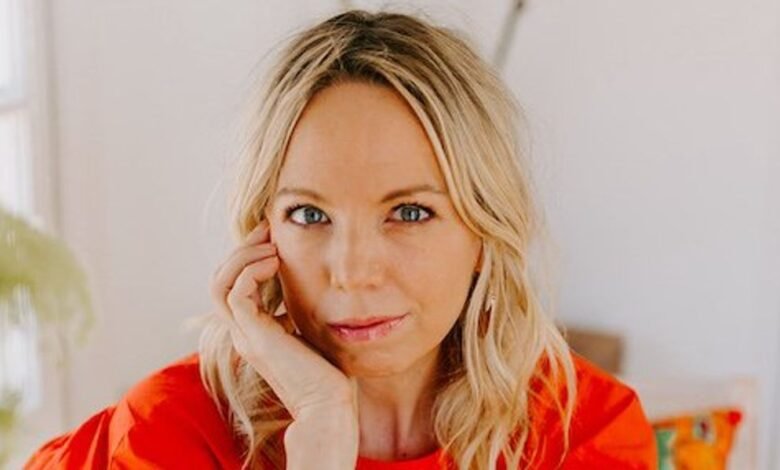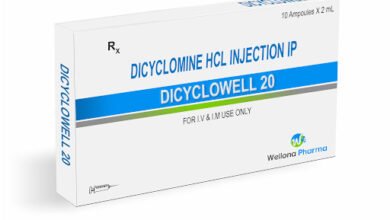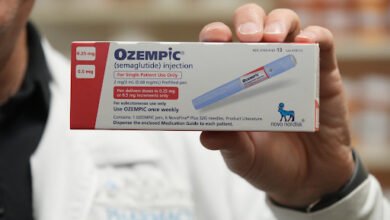Rape Is a Lifelong Condition — But It No Longer Defines Me

April is Sexual Assault Awareness Month.
I was a 22-year-old record label manager with siren-red dyed hair the night I was attacked at knifepoint in front of my New York City apartment door. The stranger bound, blindfolded and brutally raped me for hours. I did not float above my body and watch the events from above. My mind was laser-focused on staying alive, so I was fully present the entire time, storing every second in my head.
I had been a social butterfly full of hope and wonder — intoxicated by love, art, music and possibility — but that version of me left my body the moment police flooded our home, now a crime scene. I lost the roof over my head, my job, friends, family members, independence and security. Most of all, I lost myself.
Growing up in a dysfunctional home and enduring physical, verbal, emotional and sexual abuse from the time I was an infant through my teen years, I developed an anxiety disorder early on. But after the rape, I could barely walk a city block without feeling like I would pass out. Everything was a threat: people, crowds, noise, silence, heat, stores, subways. I didn’t feel safe inside my home, either, because my mind and body were in a perpetual state of fight-or-flight. Later, I would read about complex-PTSD and know it was also a part of my new identity.
I moved from apartment to apartment every six months or so in fear for my life. The rapist had threatened to kill me if I called the police, which I did, and the case had leaked to the press. He could be anyone in a city of over 8 million strangers, waiting to finish what he promised to do.
My doctors told me I’d never pass out from an anxiety disorder. On my way to work one morning, a wave of terror overtook me like a tidal wave. I broke into a cold sweat, and my vision blurred. I got off at my stop, and the next thing I remember was seeing wingtip shoes and leather pumps step over my body on the subway platform. The station was several levels below the street, and it seemed like forever before the paramedics arrived to transport me to the emergency room. The doctor who attended to me said I had a run-of-the-mill panic attack, and I was released without support, medication or resources. Like the feeling of being hunted by a rapist, now I knew that blacking out from anxiety could happen at any time.
My psychologist prescribed me anti-anxiety medication, but it didn’t prevent three-day panic attacks so debilitating I couldn’t leave my bed. I was always dissociated from my body, and most days felt like torture. I hid my pain and sadness in overworking, alcohol, food deprivation, staying busy, dating unavailable men and creating art. I saw several mental health professionals over the years, none of which ever mentioned depression. My takeaway was that it was normal for me to feel sad, but it was also my job to hide it. As terrifying and misunderstood as I felt having an anxiety disorder, there was a distinct stigma and shame around sadness. Not many people want to be friends with, date or marry the sad girl. I was told to move past the rape and be a thriving survivor. It was never suggested that I take the time to heal myself first — or what that even looked like.
Whether I was with a group of friends or isolated at home, I often felt a deep sense of dread and heartache. I had become a sexual assault advocate and found it much easier to focus on other survivors than concentrate on my own life. It gave me a sense of purpose that the pain and health issues I had weren’t for nothing, but I was often bereft, like someone placed me on a paper boat and pushed me out to sea. Rape stole me from myself, and I didn’t recognize the person I had become.
I had severe body dysmorphia, and eating was a difficult task. I was skin and bones. I went through periods where I skipped most meals and couldn’t finish a protein bar. On breezy days, my friends would say, “If we can’t find Marnie, she may have blown away.” It saddens me now to remember how many compliments I received when I was anorexic and shopped in the kid’s clothing section.
Almost a decade after I was attacked, the rapist was caught through a state initiative to re-examine rape kits before the then 10-year statute of limitations ran out. Within weeks, he was caught, and a year later, we went to trial. I was grateful that the case was solved, but I knew reliving my past would test my physical and mental health — and my relationships. I was in a serious relationship, lived in an apartment that felt like home, and had a job I loved. The weight I felt in my heart, anxiety, sad spells and body issues hadn’t left me, but they had improved.
I took the same approach to the trial as I did to my sullen days — push it down, overextend myself and continue ignoring what my body desperately tried to tell me. The rapist was found guilty, but the sentencing only temporarily reduced some of my health issues. It wasn’t the cure that family and friends believed it would be for me. “It’s over!” they said. “He can’t hurt you now.” The notion that the sentencing would fix me made me isolate myself even more. The rape followed me wherever I went. It was an unwelcome guest inside me that never checked out.
Years later, after moving to Los Angeles, getting married and then divorced, I began focusing on my needs. I prioritized self-care with rigorous yoga, meditation and running practices. It helped me to feel stronger, but my sadness deepened. Why couldn’t I find happiness when spun-gold sunshine warmed my shoulders while hiking to the Hollywood sign in mid-December, or dipping my toes into the Pacific Ocean? These were dreamy days laced with ink-black clouds hovering above my head.
My then-husband suggested I check out a 12-step meeting when I was distraught by someone’s drug use. The program introduced me to a gentler, spiritual way to manage my life and put my needs first. I stopped muscling through life, especially the parts designed to help me heal. I leaned into the community and began to practice radical honesty. I also worked on caring for my inner child and found a therapist who specialized in EMDR.
Talking about my depression felt like stepping off a cliff, praying a safety net would catch my fall. I thought I would be seen as less capable, further separating me from friends, family and peers. I didn’t know how to express that I am an optimist, a dreamer, a doer at my core. Since no doctor had ever diagnosed me with depression, it was that much harder to admit it to myself. During the pandemic, a few of my “happy” friends shared on social media that they had been hiding their depression for decades. I reached out to them, and we talked about our experiences and ways we could support each other.
Although having been raped will always be a part of me, it no longer defines me. It has taken more than 20 years to access effective therapy and other healing methods that minimize its hold on me. There’s no sidestepping the fallout of rape or the years it takes to recover. Everyone heals in their own way and at their own pace. As an advocate, writer and public speaker, I focus on giving rape survivors the space to heal with support, empathy and grace. This helps women feel less pressure to minimize their experiences and encourages them to get proper diagnoses and treatments that work for them. Today, I turn to writing, yoga, a gratitude practice and other creative outlets to release unwanted emotions. I’ve found freedom in having clarity about my mental wellness and the ability to self-soothe and love myself.
If you or someone you know is or has been a victim of sexual assault, contact the National Sexual Assault Hotline at 800-656-HOPE (4673) or the National Domestic Violence Hotlineat 800-799-SAFE (7233).
Resources
RAINN
Have a Real Women, Real Stories of your own you want to share? Let us know.
Our Real Women, Real Stories are the authentic experiences of real-life women. The views, opinions and experiences shared in these stories are not endorsed by HealthyWomen and do not necessarily reflect the official policy or position of HealthyWomen.
Source link
#Rape #Lifelong #Condition #Longer #Defines



